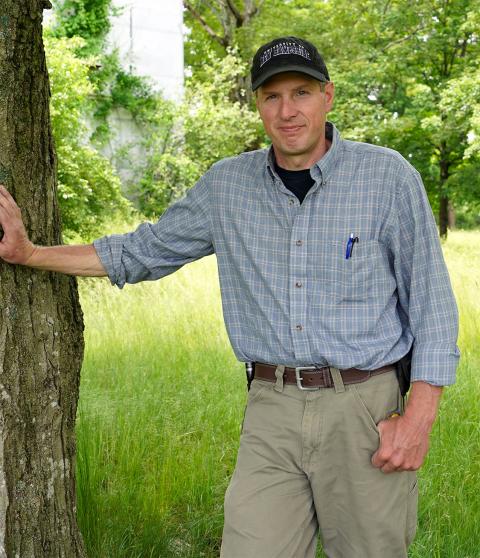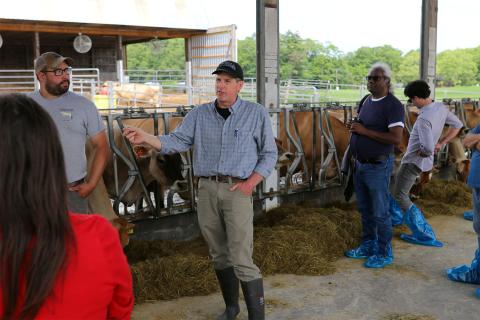
Jason Scruton has spent his entire life working in the New Hampshire dairy industry. He’s the fourth generation to oversee Scruton’s Dairy Farm in Farmington, New Hampshire; the farm is now managed by his son, Jacob, the fifth generation of Scruton dairy farmers in the state.
“My great grandfather purchased the land where Scruton’s Dairy is located now after a fire destroyed the previous farm up near Blue Job Mountain,” said Scruton. “That was in 1926.”
During his last year of UNH’s dairy management program, Jason also began managing his family's dairy herd. So, in addition to overseeing UNH’s 25 teaching cows, which prior to the CREAM program was the responsibility of senior students in the dairy management program, he also oversaw operations at Scruton’s Dairy. Close to three decades later, he’s back at UNH overseeing a different dairy herd, this one at the Organic Dairy Research Farm.
Position: Farm Manager, Organic Dairy Research Farm
Year began with NHAES: 2023
Previous positions: Grew up on and eventually began overseeing the herd and dairy operations of Scruton’s Dairy Farm. Completed UNH’s dairy management program in the late 1990s. Upon graduating, worked as herdsman at his family’s farm, then as a dairy business specialist for Blue Seal Feeds/Kent Nutrition before returning to the family farm to oversee it.
Jason Scruton: When I started overseeing the family farm’s dairy herd, we had about 275 cows. We eventually got up to 300 cows when my father, Arthur ’71; my grandfather, Frank; and I were milking together.
We’re smaller now—labor shortages and the pandemic have caused us to cut back significantly in size. Now we have about 60 cows and we’re milking with a robot.
It sounds like a smaller operation has allowed you to explore various innovative practices.
Jason: Yes. We’re working on getting the robot working at full capacity and automating some of these processes. The bigger goal is to really focus on agritourism and on value-added products. We’re in a popular farm country in the state, so we’re really trying to take advantage of that and attract some of our customer base to the farm.
We’re right at the beginning of that transition from more of a working farm to a diversified agritourism site. We’re focusing on the cows we have and determining how best we can use the land. For instance, there are buildings on the farm we don’t need any more so we’re thinking about how we can either remove or convert those structures for agritourism. And we’re thinking about bringing in other types of animals. For instance, our family has a long history of training steers, so we’re seeing if we can bring that back. Right now, we’re just at the beginning stages of integrating agritourism into our farm.


On the left, Jason Scruton leads a tour of employees from Stonyfield Organic. New Hampshire-based Stonyfield Organic provided start-up funding for the UNH Organic Dairy Research Farm. The Scruton family has been farming in the Granite State for more than a century.
What did you do as a dairy business specialist?
Jason: From 2003-08, I left the family business to work as a dairy business specialist with Blue Seal. In this role, I consulted with farmers to design and adapt diets for their herds. Years ago, this would have been more of a grain salesperson, but when I was working as a DBS, the position focused more on boosting herd health and productivity and solving issues through nutritional solutions.
What’s the transition been like from a conventional dairy operation to an organic dairy?
Jason: It’s a fun challenge, applying my conventional dairy skillset to an organic dairy. At our conventional family dairy, we’ve focused on cow comfort and heard health for decades, which is applicable in both models.
Over the last five or so years, we have been moving away from the use of antibiotics unless it is medically necessary. There are many older animals at my family farm that have never received antibiotics. We also use precision monitoring equipment to find sick cows and animals to breed. This helps keep animals heathier and reduces the need for hormone treatments, which we can’t use at the organic dairy. Similar equipment is in use at the organic dairy, and I am expanding its use. I’m finding that most of my experience applies to the organic dairy and that I’m just operating under a new set of rules.
What attracted you to the organic dairy farm manager position at UNH?
Jason: I really like research and data. I’m very data driven on my family’s farm and the robot is nice because it provides a lot of information. When I attended UNH as a student, I was involved in some research at the UNH dairy. Working as a dairy business specialist at Blue Seal was all about analyzing data. The research and the data collection have always been interesting to me, so being involved in making that research happen was an important selling point.
I like challenges too and that problem-solving mindset is important regardless of what type of dairy farm you oversee, but I would say even more so for an organic dairy operation. I’ve studied a lot about organic dairies, so now I’m applying that information. I also feel that bringing a long history of conventional dairy farming and an “outside” perspective to organic farming will help as well.